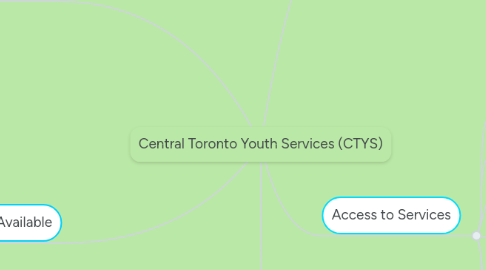Central Toronto Youth Services (CTYS)
por Kristin Moyer

1. Equity & Inclusion
1.1. Acknowledges the "barriers" and "systemic oppression in society" in mission statement
1.2. Comitted to having a stronger representation on their board and staff
1.3. Using a constructionist approach to their social media platform by using the youths' ideas to create the media
1.4. One of their values listed is ensuring that their resources are accessible to all of their clients
2. Programs Available
2.1. School Priority Access Program - Referral comes from school board. Youth can receive counselling for mental health issues and to discuss pressures from society.
2.2. RITES for African-Canadian youth- Students are identified by school personnel, youth justice, or child welfare workers. In this program students are exposed to activities which promote youth development, strengthen racial identity and build self-esteem.
2.3. Community Outreach Program- Students and families can receive counselling for all mental health issues. These are professional services provided by social workers.
2.4. Some group programs for LGBTQ2S- Families in TRANSition (FIT) - Group for parents for youth transitioning Boyoboy – for gender identity
2.4.1. Boyoboy – for gender identity
2.4.2. Transceptance
3. Their website has a resource page that has links and information in regards to getting other forms of help such as housing provided by other agencies, other community services in the area, government forms, health services and more.
4. Goals & Services
4.1. Overs programs for Toronto-based youth, young adults and their families who are experiencing mental health issues. They also help resolve social conflicts.
4.2. Their service is aimed to provide help for at-risk youth especially
4.3. Their services are free of charge
4.4. CTYS programs include - helping LGBTQ2S youth, those recovering from serious mental illness and those who are involved with youth court
4.5. "CTYS will be a leader in providing excellent, innovative, collaborative, responsive services that meet the mental health needs of youth within the changing social context impacting them, their families and their communities."
5. Access to Services
5.1. Some services operate at certain times and go by drop-ins
5.2. For counselling they take referrals from the TDSB and TDCSB
5.3. Services are free and they provide TTC tokens if needed for travelling
5.4. Most spaces are wheelchair accessible and washrooms are gender neutral
5.5. They take referrals from mental health professionals, child workers, other social agencies and Toronto probation officers at youth court
5.6. Each program also has a person to contact with their contact information provided in order to get enrolled into the class



